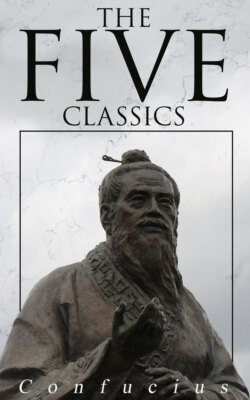Читать книгу The Five Classics - Confucius - Страница 73
На сайте Литреса книга снята с продажи.
ОглавлениеHexagram LVII.57 Sun
Table of Contents
Sun intimates that (under the conditions which it denotes) there will be some little attainment and progress. There will be advantage in movement onward in whatever direction. It will be advantageous (also) to see the great man.
1. The first line, divided, shows its subject (now) advancing, (now) receding. It would be advantageous for him to have the firm correctness of a brave soldier.
2. The second line, undivided, shows the representative of Sun beneath a couch, and employing diviners and exorcists in a way bordering on confusion. There will be good fortune and no error.
3. The third line, undivided, shows its subject penetrating (only) by violent and repeated efforts. There will be occasion for regret.
4. The fourth line, divided, shows all occasion for repentance (in its subject) passed away. He takes game for its threefold use in his hunting.
5. The fifth line, undivided, shows that with firm correctness there will be good fortune (to its subject). All occasion for repentance will disappear, and all his movements will be advantageous. There may have been no (good) beginning, but there will be a (good) end. Three days before making any changes, (let him give notice of them); and three days after, (let him reconsider them). There will (thus) be good fortune.
6. The sixth line, undivided, shows the representative of penetration beneath a couch, and having lost the axe with which he executed his decisions. However firm and correct he may (try to) be, there will be evil.
Footnotes
57. With Sun as the fifth of the Fû-hsî trigrams we have become familiar. It symbolises both wind and wood; and has the attributes of flexibility (nearly allied to docility) and penetration. In this hexagram we are to think of it as representing wind with its penetrating power, finding its way into every corner and cranny.
Confucius once said (Analects 12. 19):--'The relation between superiors and inferiors is like that between the wind and the grass. The grass must bend when the wind blows upon it.' In accordance with this, the subject of the hexagram must be understood as the influence and orders of government designed to remedy what is wrong in the people. The 'Daily Lecture' says that the upper trigram denotes the orders issuing from the ruler, and the lower the obedience rendered to them by the people; but this view is hardly borne out by the Text.
But how is it that the figure represents merely 'some little attainment?' This is generally explained by taking the first line of the trigram as indicating what the subject of it can do. But over the weak first line are two strong lines, so that its subject can accomplish but little. The Khang-hsî editors, rejecting this view, contend that, the idea of the whole figure being penetration, line 1, the symbol of weakness and what is bad, will not be able to offer much resistance to the subjects of the other lines, which will enter and dispel its influence. They illustrate this from processes of nature, education, and politics; the effect they say is described as small, because the process is not to revolutionise or renew, but only to p. 192 correct and improve. Such as it is, however, it requires the operation of the strong and virtuous, 'the great man.' Even all this criticism is not entirely satisfactory.
Line 1 is weak, where it should be strong. The movements of its subject are expressive of perplexity. He wants vigour and decision.
Line 2 is strong, and in the right place, and has a good auspice. Things are placed or hidden beneath a couch or bed; and the subject of the line appears as searching for them. He calls in divination to assist his judgment, and exorcists to expel for him what is bad. The work is great and difficult, so that he appears almost distracted by it; but the issue is good. For this successful explanation of the line, I am indebted to the Khang-hsî editors. The writer of the Text believed of course in divination and exorcism; which was his misfortune rather than his fault or folly.
Line 3 is in the right place for a strong line. But its position at the top of the lower trigram is supposed to indicate the restlessness, and here the vehemence, of its subject. And 6 is no proper correlate. All the striving is ineffective, and there is occasion for regret.
Line 4 is weak, as is its correlate in 1. But 4 is a proper place for a weak line, and it rests under the shadow of the strong and central 5. Hence the omens of evil are counteracted; and a good auspice is obtained. The game caught in hunting was divided into three portions:--the first for use in sacrifices; the second for the entertainment of visitors; and the third for the kitchen generally. A hunt which yielded enough for all these purposes was deemed very successful.
On line 5 Khăng-ȝze says:--'It is the seat of honour, and the p. 193 place for the lord of Sun, from whom there issue all charges and commands. It is central and correct; we must find in its subject the qualities denoted by Sun in their greatest excellence. But those qualities are docility and accordance with what is right; and the advantage of firm correctness is insisted on. With this all will be right.' With the concluding sentence compare the conclusion of the Thwan of hexagram 18.
The evil that paragraph 6 concludes with would arise from the quality of Sun being carried to excess. I have followed the Khang-hsî editors in adopting a change of one character in the received Text.
